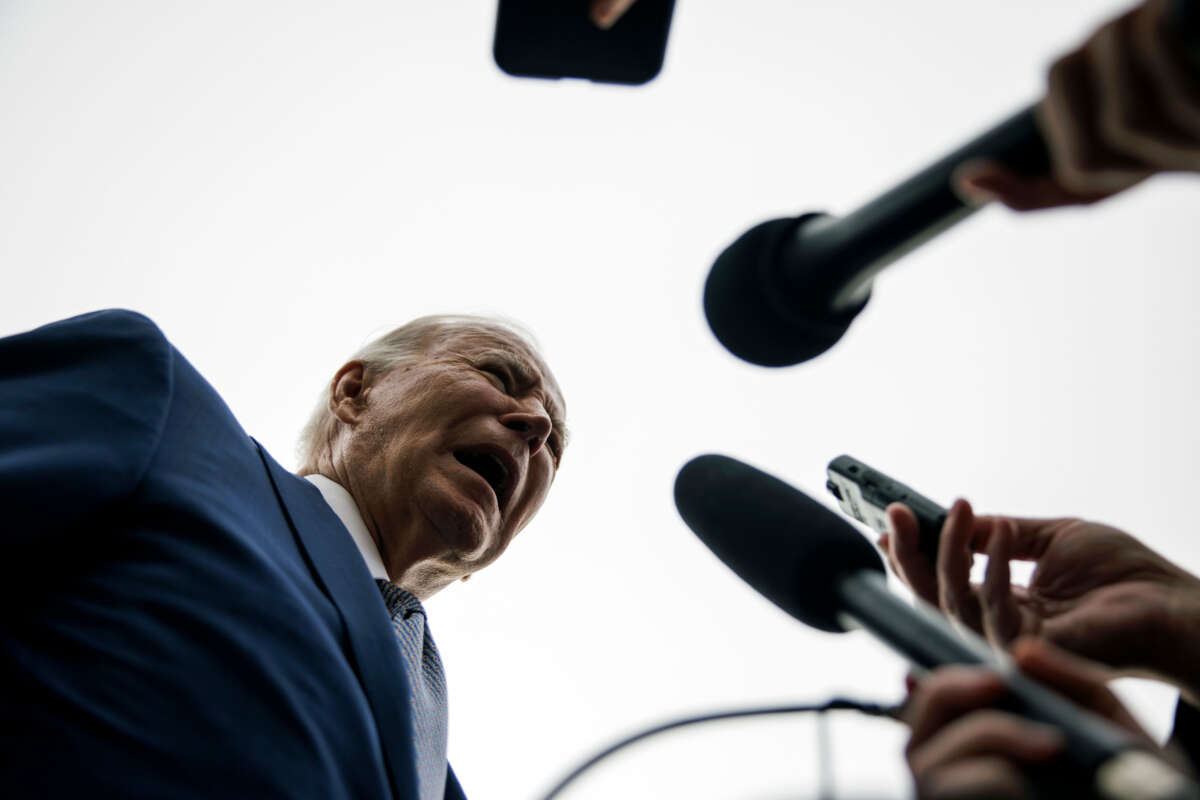Did you know that Truthout is a nonprofit and independently funded by readers like you? If you value what we do, please support our work with a donation.
In a stark statement, President Joe Biden has admitted that the widely decried U.S. bombing campaign in Yemen isn’t actually having an effect on the Houthi blockade — but vowed to continue the bombings anyway.
Outside of the White House on Thursday, a reporter asked Biden if the airstrikes in Yemen have been “working.”
“Well, when you say ‘working,’ are they stopping the Houthis? No. Are they going to continue? Yes,” Biden replied.
The U.S. has launched five rounds of strikes in Yemen in Houthi-controlled areas so far, with the U.K. also engaging in its own attacks; one of the rounds of U.S. strikes was launched shortly after Biden’s remark, as promised.
The strikes are the latest in a long campaign of U.S. repression and violence in Yemen, in which attacks using U.S. weapons have fueled a major humanitarian crisis in the region — a situation that advocates against the U.S. and U.K. strikes say is only made worse by Biden’s reimposing of a “specially designated global terrorist” label on the Houthis.
Biden’s frank statement has been widely ridiculed by progressives who maintain that the bombings, done without the direct approval of Congress, are unconstitutional and a severe overstep in power by the Biden administration to further destabilize the Middle East.
To many, the statement was symbolic of how the U.S. typically engages in military actions in the Middle East and with foreign policy in general — “Biden’s foreign policy in a nutshell,” The Nation writer Jeet Heer wrote on social media.
“‘A failure, but we’ll keep doing it anyway.’ Finally, a President is honest about US foreign policy,” said Guardian columnist Owen Jones.
Rep. Ro Khanna (D-California) also chimed in, saying that Biden should rethink his approach. “Glad [Biden] agrees with me that the strikes are not working. Next time come to Congress instead of [controversial Middle East White House Adviser Brett] McGurk,” Khanna wrote.
It’s possible, perhaps likely, that Biden’s comment doesn’t mean that he believes the strikes will not eventually succeed— rather, he may mean that they haven’t yet stopped the blockade entirely. But anti-war advocates have long noted that the U.S.’s military incursions abroad are rarely effective at their stated mission, citing the suffering and widespread civilian death caused by the U.S.’s catastrophic war in Afghanistan as a recent example.
In the same way, advocates have been warning that the current bombing campaign could only serve to further empower the Houthis in the long term, while contributing to an extremely volatile situation in the Middle East and causing yet more suffering at the hands of the U.S. empire.
“Along with deploying aircraft carriers to ’deter Iran,’ the United States says it is launching attacks against targets inside Yemen to ’degrade Houthi rebels’ ability,’”wrote Institute for Policy Studies fellow Phyllis Bennis for In These Times this week. “But years of far more intensive U.S.-backed Saudi bombing have failed to destroy Houthi military capacity, and this campaign will similarly fail to achieve the stated objectives.”
To The Intercept’s Ryan Grim, meanwhile, Biden’s statement was somewhat of a confession as to the efficacy of the decades of U.S. military intervention in the Middle East. “There’s zero reason to think these sanctions or these airstrikes will get them to stop their blockade of shipping,” Grim wrote. “It’s amazing to see Biden admit it.”
Speaking against the authoritarian crackdown
In the midst of a nationwide attack on civil liberties, Truthout urgently needs your help.
Journalism is a critical tool in the fight against Trump and his extremist agenda. The right wing knows this — that’s why they’ve taken over many legacy media publications.
But we won’t let truth be replaced by propaganda. As the Trump administration works to silence dissent, please support nonprofit independent journalism. Truthout is almost entirely funded by individual giving, so a one-time or monthly donation goes a long way. Click below to sustain our work.
